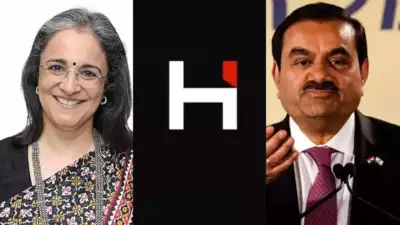
The recent political debate surrounding the Hindenburg Report has triggered a heated exchange between India’s major political parties, particularly the Congress and the BJP. This controversy has taken center stage in Indian politics, with both sides fiercely defending their positions and calling for various actions. The Hindenburg Report initially focused on the financial dealings of a major conglomerate, has now expanded into a broader political battle, questioning the integrity and role of India’s financial regulatory body, SEBI (Securities and Exchange Board of India).
The Hindenburg Report: A Recap
The Hindenburg Report, published by a U.S.-based research firm, raised serious allegations about financial irregularities within one of India’s largest conglomerates. The report highlighted concerns over accounting practices, financial disclosures, and potential market manipulation. The report’s release led to a significant impact on the stock market, with the company’s shares plummeting and wiping out billions in market capitalization.
As the dust settled on the initial market reaction, political parties in India began to weigh in on the issue. The Congress party, in particular, has been vocal in its demands for a thorough investigation into the matter. The party has called for a Joint Parliamentary Committee (JPC) probe into the role of SEBI, alleging that the regulatory body may have failed in its duties to oversee and regulate the conglomerate’s financial activities.
Congress’ Demand for a JPC Probe
The Congress party’s demand for a JPC probe is rooted in its belief that SEBI’s role in the Hindenburg Report controversy needs to be thoroughly examined. The party has questioned whether SEBI acted independently and transparently in its regulatory duties or whether there were lapses that allowed the alleged financial irregularities to go unchecked.
The Congress’ stance is that a JPC probe would ensure a comprehensive and impartial investigation into SEBI’s actions. The party argues that such a probe is necessary to restore public trust in India’s financial regulatory framework and to hold accountable those who may have been involved in any wrongdoing.
BJP’s Response: A Conspiracy Theory?
On the other side of the political spectrum, the BJP has dismissed the Congress’ demands as nothing more than a politically motivated conspiracy. The ruling party has accused the Congress of trying to create a scandal where none exists, purely for political gain. According to the BJP, the Congress’ calls for a JPC probe are part of a broader strategy to undermine the government’s credibility and sow doubt about India’s financial institutions.
The BJP has also questioned the timing of the Congress’ demands, suggesting that they are aimed at diverting attention from other pressing issues. The ruling party has reiterated its confidence in SEBI and its ability to carry out its regulatory duties without interference. The BJP’s stance is that SEBI has already initiated the necessary actions to address the concerns raised in the Hindenburg Report, and a JPC probe is both unnecessary and politically motivated.
SEBI’s Role Under Scrutiny
Amidst this political tug-of-war, SEBI finds itself in a challenging position. As India’s primary financial regulatory body, SEBI is tasked with ensuring market transparency, protecting investors, and maintaining the integrity of the financial system. The Hindenburg Report’s allegations have cast a shadow over SEBI’s role in regulating one of India’s largest conglomerates, raising questions about its effectiveness and independence.
Critics argue that SEBI may have been too lenient in its oversight of the conglomerate, allowing potential financial irregularities to go unnoticed or unaddressed. This perception has fueled the Congress’ demand for a JPC probe, as the party believes that SEBI’s actions (or lack thereof) warrant closer examination.
On the other hand, SEBI has defended its actions, stating that it has taken appropriate steps to investigate the issues raised in the Hindenburg Report. The regulatory body has pointed to its ongoing investigations and the actions it has already taken as evidence of its commitment to upholding market integrity. However, the pressure on SEBI to demonstrate its effectiveness continues to mount, especially as the political battle intensifies.
The Broader Implications
The Hindenburg Report controversy and the ensuing political battle have broader implications for India’s financial markets and regulatory framework. At its core, the issue raises questions about the effectiveness of regulatory oversight in India and the potential for political interference in financial matters.
For investors, the controversy has created uncertainty about the stability and transparency of India’s financial markets. The sharp decline in the conglomerate’s share price following the release of the Hindenburg Report serves as a stark reminder of the potential risks associated with investing in companies that may be subject to regulatory scrutiny. This uncertainty could chilling effect on investor confidence, both domestically and internationally.
From a regulatory perspective, the controversy underscores the importance of maintaining a robust and independent regulatory framework. SEBI’s ability to navigate this crisis and restore confidence in its oversight capabilities will be critical in determining the long-term impact of the Hindenburg Report controversy. Any perceived weaknesses or lapses in SEBI’s actions could lead to calls for further reforms and a reevaluation of India’s financial regulatory system.
The Political Dimension
Beyond the financial and regulatory implications, the Hindenburg Report controversy has also highlighted the deeply polarized nature of Indian politics. The sharp divide between the Congress and the BJP on this issue reflects the broader political climate in India, where even financial matters can quickly become politicized.
For the Congress, the controversy represents an opportunity to challenge the BJP’s economic growth and good governance narrative. By calling for a JPC probe into SEBI’s role, Congress is positioning itself as a party committed to transparency and accountability. However, the party risks being seen as opportunistic if its demands are perceived as purely politically motivated.
For the BJP, the challenge lies in defending its track record on economic and financial matters while dismissing the Congress’ demands as baseless. The ruling party’s response to the Hindenburg Report controversy will be closely watched, particularly as it seeks to maintain its image as a pro-business, pro-investment government. Any missteps could be used by the Congress to further its narrative of a government that is out of touch with the concerns of ordinary Indians.
The Road Ahead
As the political battle over the Hindenburg Report controversy continues, the focus will likely remain on SEBI and its actions. The regulatory body’s ability to effectively address the concerns raised in the report and restore confidence in India’s financial markets will be crucial in determining the outcome of this controversy.
For now, the Congress’ demand for a JPC probe remains a point of contention, with the BJP firmly opposed to the idea. Whether or not a JPC probe is ultimately convened, the controversy has already succeeded in drawing attention to the complex and often fraught relationship between politics and finance in India.
In the coming months, the Hindenburg Report controversy will likely continue to be a focal point of political debate in India. The outcome of this debate could have far-reaching implications for India’s financial markets, regulatory framework, and political landscape. As the situation evolves, both the Congress and the BJP will need to navigate the challenges and opportunities presented by this controversy, with the potential for significant consequences on the horizon.
The Hindenburg Report controversy serves as a reminder of the interconnected nature of politics, finance, and regulation in India. As the country’s political parties continue to spar over the issue, the need for a balanced and effective regulatory framework that can withstand both financial and political pressures has never been more apparent. The road ahead will be challenging, but it is a journey that India must undertake to ensure the continued growth and stability of its financial markets.
